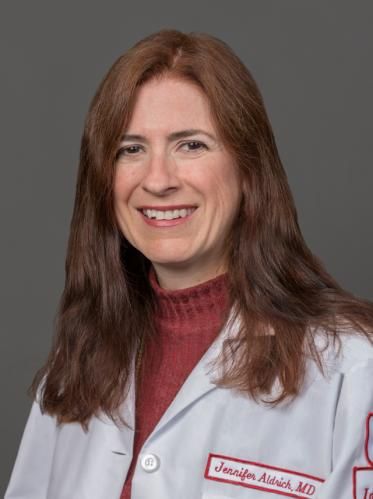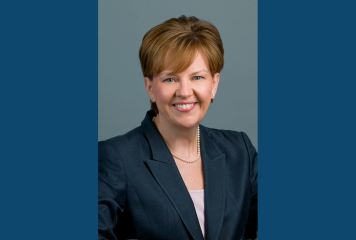
Dr. Jennifer Aldrich is a Professor of Clinical Medicine at Temple Health – Temple University Health System. She is ABIM Board Certified in Internal Medicine and Infectious Disease. Dr. Aldrich has worked with LGBTQ+ patients for more than 20 years, and spoke with ABIM about her career and how physicians can make their practices more welcoming to the LGBTQ+ community.
How did you become involved in transgender medicine? What do you like about it?
I have been practicing HIV primary care for almost 30 years now. In my HIV practice, I was taking care of transgender women who were either having to go elsewhere for their hormones, or who were getting them on the street because there weren’t enough providers who would prescribe for them. I realized that in order to provide the best care to my patients, I needed to learn gender affirming medicine. Once I started, I realized how wonderful it is – when was the last time someone cried tears of joy because they were being prescribed antihypertensives or cholesterol meds? But that happens, not infrequently, when I first start someone on hormones. It’s pretty great to bring patients some joy and relief. I also appreciate my position of privilege as a white cis-gender woman, and to be an ally and an advocate feels very meaningful.
How do you respond to physicians who believe gender is the physical biology of their patient?
That’s challenging and frustrating. I think for some physicians, it may just be a matter of ongoing education and familiarity – they may be willing to learn, but never had the opportunity or exposure in the past. For others, unfortunately, it’s a deep-seated belief. We try to vet offices and physicians for our patients so that we can steer them away from places that will cause them pain and harm. I wish we didn’t have to do that – our health care system should be safe and accessible to all. I hope that by including more teaching on gender affirming healthcare in our training programs, we will have a more welcoming system in the future.
Gender-affirming health care services have come under fire in many states recently. In Texas, the Governor asked authorities to investigate gender-affirming medical care for transgender youth as child abuse. Can you talk about the importance of providing gender-affirming care?
There have been lots of studies that show that people in the transgender community have significantly higher rates of mood disorders. Anxiety and depression are much more prevalent in the transgender community than in their cisgender peers, and as many as 40 percent of trans people have attempted suicide in the past. We also know that in addition to dysphoria a major contributor to depression and anxiety is transphobia. When we do not provide affirming services and don’t allow patients to relieve their dysphoria, that is very harmful. By singling out gender-affirming services, these states are perpetuating transphobia which is directly harmful to the mental and physical health of the trans community. Being young is hard enough; being trans and young is even harder. We know that transgender young people are also at risk of suffering violence at the hands of schoolmates and their family, and they’re at higher risk of being homeless and in foster service system, so denial of medically-appropriate care increases their risk of suicidality significantly and is incredibly harmful.
What can the health care system or individual physicians do to combat this and how can independent physicians provide better support?
Traditionally, the medical system and the medical education system provided no information about trans health and gender-affirming care, and many of us who are practicing either learned from each other or just by seeking out information independently. Until recently, and it depends on the curriculum, little to nothing was taught about transgender health. I learned nothing about transgender health when I was a medical student, a resident or a fellow. So, the first thing that we can do as a profession is to make sure that we are teaching that gender-affirming care is the best care that we can provide, and I don’t mean just hormones and surgeries, I mean being affirming of who somebody is. Not all patients want hormones or surgery but they do want to be validated and respected. The other thing we can do is specifically train providers to become experts so that there is not a huge under-supply of well-trained people, because that’s the current situation. Here in Philadelphia, there are wait lists for as long as a year to start gender-affirming therapy and that’s not acceptable. We don’t make people wait a year to start therapy for diabetes, we don’t make people wait a year to start therapy for hypertension, so why does this happen for gender-affirming care. Finally, I think we need to reduce barriers. There’s been traditionally a paternalistic approach to gender-affirming care, where the profession felt we needed permission from mental health professionals in order to start hormones or have surgery. Those barriers still exist in many cases, particularly for surgeries. But in my experience, patients who are transgender have had gender dysphoria for a very long time, are able to articulate that very well, and have a feeling of dysphoria that is consistent and persistent. And we need to recognize that, and appreciate that trans people can advocate for themselves and decide what is best for themselves, and they should not need a mental health professional’s permission. That’s not that we don’t welcome the input from a mental health professional, but we shouldn’t be using that as a barrier.
What advice would you have for a physician who isn’t experienced in transgender medicine or gender-affirming care and wants to better serve transgender patients? What should they be thinking about in terms of creating a welcoming environment?
That’s a big question. There are things we often have more control over than not. Even if someone is not an expert in prescribing hormones or is not specifically a gender-affirming surgeon, there are very easy things that people can learn and should adopt. One is that we introduce ourselves with our pronouns and make those visible so that patients can then feel comfortable sharing their pronouns; we need to understand the importance of those pronouns, and the harm that is caused when we use the incorrect pronouns or when we use the incorrect name for a patient. The second question is to ask what name the patient goes by. That’s a nonthreatening question that anyone can answer. I go by Jenny or go by Jen but the answer may be I go by Tom. Making patients feel comfortable sharing that changes the whole dynamic of a visit. Teaching the staff in the office is another component of that welcoming care and making sure that staff don’t dead name or misgender patients, and making sure that they understand the importance of respecting people.
There are ways we can make our offices more welcoming, like not having gendered bathrooms. Having artwork and literature that is representative and inclusive are easy things that somebody can do in their office.
It is harder to change the culture of the health care system, but that doesn’t mean we shouldn’t be trying, and we are trying. It’s a bigger hill to climb: it’s a process that involves a lot of education, discussions with administration and HR and all of the policy makers at the top, and then making sure when people are onboarded they all receive the appropriate training. The training has to be reinforced on a regular basis as part of competencies or whatever system is used in that institution. But I won’t lie and say it’s an easy thing. It’s an ongoing challenge and one we aren’t perfect at. There are always new people in the system and there are always new challenges, but we have to do this in order to provide the best care to the trans population.
Do you feel the medical educational system has improved?
Yes, though there is a lot of room for improvement. I personally give two or three hours of lectures myself and one of those hours was specifically requested by the medical students because they had no teaching on gender-affirming hormones in their curriculum. So, if you can imagine medical students asking for extra lectures…I feel like this younger generation is much more accepting and open and wants to learn, and that is a great thing and we need to meet that. Physicians should be tested, and it should be part of what is required knowledge, because ultimately if you have to know something for a test you will learn it. Hopefully permanently.
Do you think an organization like ABIM should start incorporating these kinds questions on its assessments?
Absolutely, and it doesn’t have to be super detailed such as what dose of testosterone do you give to somebody with this or that, but just understanding the basics of providing care even if you’re a specialist – it should be included in testing.
You mentioned one of the barriers to providing good gender affirming care is consulting with mental health professionals. What other barriers need to be addressed?
There’s the barrier of not enough providers, and there’s the barrier of insurance. As a whole, the trans population is more likely to be unemployed, they’re more likely to live below the poverty level, and they often have had prior negative experiences with the health care community that make them very apprehensive about seeking health care. We need to eliminate all of those and make it clear that we welcome the trans community and that we will treat them with respect. We also need to assist people with accessing insurance and making sure that insurance covers gender-affirming therapy, which is another barrier. I’m still dealing with an insurance company which I believe is illegally telling a patient it won’t cover any medications for gender dysphoria. Fortunately, in Pennsylvania the coverage for gender-affirming care is pretty good, but that’s not the case for other states necessarily.
In a way it seems like the physician working with the trans population needs to be aware of more than just the physical: they need to be concerned and aware of the emotional well-being of a patient with a higher risk of anxiety and depression, who has likely suffered trauma or physical violence, and may be in a situation or have habits that are unsafe. How can a physician help reduce some of these symptoms for a patient?
It’s hard to change a transphobic culture and a lot of violence stems from internal anger that is directed at a trans person. We can advocate for our patients to have life situations that are less dangerous. It’s harder to get a job when you’re trans, it’s harder to get a job with benefits when you’re trans, and it’s harder to get a job that pays more than minimum wage when you’re trans. There’s a lot of employment discrimination out there. And as a result, trans people may end up doing sex work or because of self-medicating in the past for trauma, anxiety depression other mental illness, they may end up using substances. We see a much higher rate of substance disorders in the transgender world. Because we criminalize sex work and substance use disorder, many transgender patients end up in prison at a higher rate than cisgender people. It’s hard for a physician directly to change all of that. We can absolutely advocate for substance use therapy and medication-assisted therapy for our patients with substance use disorders. We can coordinate with mental health providers to help people get into therapy and get appropriate psychiatric medications if appropriate. We can help patients access life circumstances that might be less dangerous for them.
How does a doctor have respectful conversations around medically necessary things that have to be addressed, no matter how you identify?
We do something called an organ inventory so if you have breast tissue, at the appropriate age you should have guideline-dictated mammograms. You have a cervix, you need cervical cancer screenings. We make it more about this is what’s necessary for your health but doesn’t define you. The other thing that’s important to do is mirror the language patients use for their bodies, so I might not say breasts I may say chest. I try to not gender things when they don’t need to be gendered. There’s no other word for cervix and most patients understand that. That’s not to say there aren’t lots of issues in providing appropriate gyn care to transmasculine patients because many have had prior trauma, and it can provoke a lot of emotions and create anxiety. It’s important to be respectful of that and to do everything that is medically possible to make it easier, and we work with affirming specialists who also understand these issues.
Is there anything you would like to add?
There are so many injustices. The fact that we send trans women to men’s prisons based on their genitalia is terrifying and of course they’re victimized. I think it’s also important when someone does gender-affirming care to couple it with other important services. So, in our office we do HIV care, we treat Hep C, we treat sexually transmitted infections, we do medication-assisted therapy for substance abuse disorder, and we will soon have a therapist. Trying to have everything in one place or at least able to link things more easily for patients is important. Often trans people will prioritize their hormones because that is what feels life-saving for them and it is lifesaving, but they may also have HIV, so by doing both things at the same time we provide better HIV care as well.



